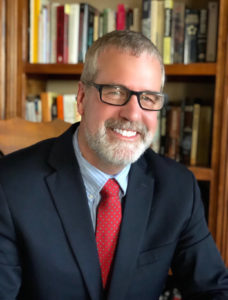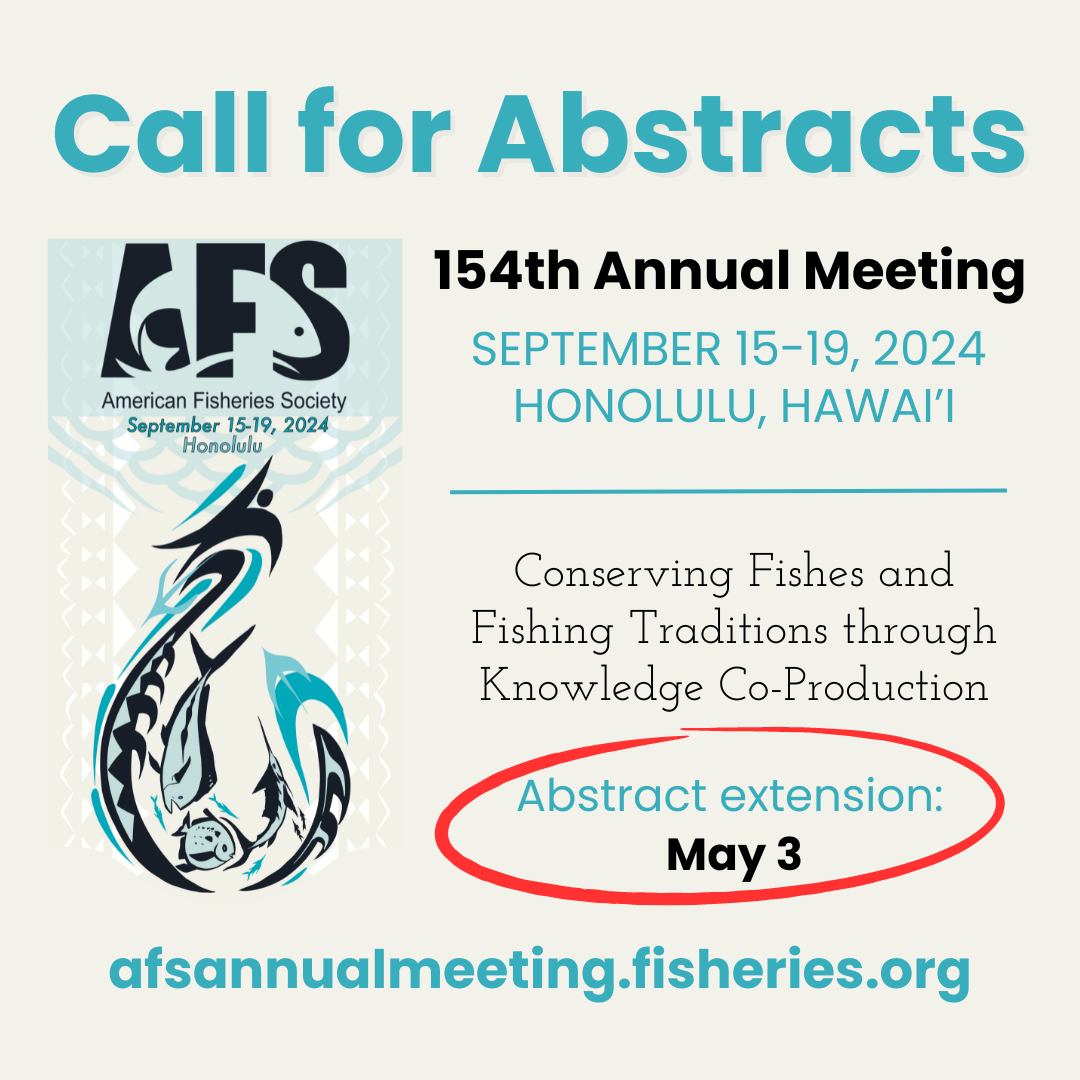Scott A. Bonar | AFS President. Email: [email protected]
 Want to fight climate change, tackle biodiversity loss, protect a multi‐ocean fishery, or get more kids outdoors? How can you make a difference? Where in the world does one begin with these big, typically overwhelming issues? As our world gets more interconnected, larger issues come to the forefront. Fortunately, there is a lot of advice on how to tackle large issues.
Want to fight climate change, tackle biodiversity loss, protect a multi‐ocean fishery, or get more kids outdoors? How can you make a difference? Where in the world does one begin with these big, typically overwhelming issues? As our world gets more interconnected, larger issues come to the forefront. Fortunately, there is a lot of advice on how to tackle large issues.
Psychologists have a great way of putting large tasks into perspective. Imagine if all the food you had to eat for the rest of your life was put into a gymnasium and someone told you to sit down and eat it. You would probably feel somewhat nauseous and think you would never be able to do it. However, by doing a little bit each day, maybe encouraging others to help you eat some of it, eating would be doable, even enjoyable. I spoke about climate change action in my last column. Therefore, I’ll use this issue as an example below. Let’s discuss how you might tackle this issue, or whatever is most important to you!
Believe in yourself! Think you’re “only” an aquatic biologist, a biology student, or a forestry assistant? Don’t think you can make progress attacking a large issue? Balderdash! The jobs just mentioned were held by Rachel Carson, Theodore Roosevelt, and Aldo Leopold, respectively. Their philosophies and their actions were shaped in part by these jobs. If they can do it, you can as well.
Prioritize. Many issues eat up our time. Put the most important ones high on your list if you are to do something meaningful. Those of us who are older remember a relative in World War II. My uncle Leon was a Marine Corps medic who went from island to island in the Pacific, participating in horrific battles. He did not want to be there, but said he had to do what needed to be done, so finishing this job was a priority to him and other members of his generation. It got in the way of their family, their jobs, and their well‐being. We, of course, appreciate what they did. Remember, E. O. Wilson and Rachel Carson have/had as much time in their day as you and also had to prioritize what is important. I care about my family, having seen the data first hand, so climate change action goes high on my priority list.
Tackle your fear. Speaking out can be scary. Especially if others do not want you to. You can alienate your friends, put your job at risk, or go against public opinion. Check the science first. Does your gut and the evidence tell you you’re right? Is your issue a priority? Then proceed knowing that fear, even a lot of it, is natural in these situations. Rachel Carson was at first called a “hysterical woman,” and other names I won’t repeat here, because of her stance on DDT (Bonar 2007). Now she is celebrated as an environmental pioneer. Perhaps some day we will read about your courage!
Reach out to the other side. Too many people spend time with only those who agree with them. Make it a point to talk with those who do not agree with you. Even in groups with the most “hardcore” members, there is a wide range of beliefs. Many people will not be exposed to your information unless you are willing to talk with them. Furthermore, you might come away with some other interesting ways to solve problems if you reach out. I have spoken with many, many people who initially denied climate change is caused by man and is an urgent problem. However, after discussions, I can usually get some into the belief column and learn about solutions I had not previously considered.
Know the evidence. Familiarize yourself with the evidence for and against your issue. I studied climate change effects and was fortunate to associate with many authors on Intergovernmental Panel on Climate Change reports and the Fourth U.S. Climate Assessment. Working with these people has increased my knowledge of the urgency of action, because these scientists showed me compelling evidence, and would sooner rob a bank than fake any data. This knowledge allows me to ask others: Is the evidence for climate change thousands of peer‐reviewed studies, available from Intergovernmental Panel on Climate Change reports, the Fourth U.S. Assessment for Climate Change, and supported by consensus of 91–100% of climate scientists, and the National Academy of Sciences from dozens of countries? Are we seeing changes right now with our own eyes? Is the evidence against human‐caused climate change usually not peer‐reviewed, from much fewer scientists, and on websites with questionable affiliations?
Give respect to get respect. Daryl Davis infiltrated the Ku Klux Klan to try to change their racist beliefs. He approached them respectfully and with friendship to challenge their beliefs and change their opinions (Davis 1997). Crazy right? His methods were controversial, but his results were not. He claimed he got over 200 former members to leave the organization, and even collected their cast‐off robes as souvenirs. By the way, Daryl Davis is black (what he preferred to be called). If Daryl Davis successfully used these conversational methods to convert people as extreme as Klan members, you stand a good chance of getting others who are less extreme to consider your viewpoint if you listen to them and treat them with respect first.
Set an example. Interested in biodiversity protection? Interested in stream conservation? Interested in climate change action? Find as many things to do as you can to support your issue. For the climate change action example, I didn’t just talk about cutting emissions. I bought an electric car and put solar panels on my roof. I feel good that I did it, and it generates others wanting to do the same thing. Think about what you might do. Need ideas? See publications like Gardner and Stern (2008). Set an example. And remember to tell others about it—through conversation, social media, or other methods. Word travels fast.
As a scientist… I try to stay away from political advocacy. Therefore, I won’t tell you how to vote. You can figure this one out for yourself—and you also know that it is mighty important!
Learn conservation communication techniques. Science is a major force that has advanced our society. Let’s not go back in time. If you want to be effective, learn to communicate your science. You would be surprised—or maybe not—how many people don’t know even the most fundamental scientific concepts about environmental conservation. They have no idea the meaning of standing crop, carrying capacity, and population growth, or (more advanced) how Ehrlich and Holdren’s (1972) equation explains the major variables that impact our natural resources. These are fundamentals, the most basic principles that govern the foundation of fisheries management. Learn how to communicate these principles in a fun, non‐threatening way to your brother who might be a steel worker, your mother who is an accountant, or your friend who is an electrical engineer. You might be surprised at the positive results. AFS has continuing education classes on how to communicate your science, and there are also many books and web resources on how to learn these techniques (Bonar 2007; Jacobson 2009).
This will get you started. Go get ‘em! Next column we will talk about what to do when conversations get rough!
The opinions and tips given here, like all my columns, are mine and do not necessarily represent AFS or my employer.
References
- Bonar, S. A. 2007. The conservation professional’s guide to working with people. Island Press, Washington, D.C.
- Davis, D. 1997. Klan‐destine relationships. New Horizon Press, Liberty Corner, New Jersey.
- Ehrlich, P. R., and J. P. Holdren. 1972. A bulletin dialogue: on “The closing circle” ‐ Critique. Bulletin of the Atomic Scientists 28: 16, 18– 27.
- Gardner, G. T., and P. C. Stern. 2008. The short list: the most effective actions U.S. households can take to curb climate change. Environment: Science and Policy for Sustainable Development 50: 5, 12– 25.
- Jacobson, S. K. 2009. Communication skills for conservation professionals. Island Press, Washington, D.C.


 Want to fight climate change, tackle biodiversity loss, protect a multi‐ocean fishery, or get more kids outdoors? How can you make a difference? Where in the world does one begin with these big, typically overwhelming issues? As our world gets more interconnected, larger issues come to the forefront. Fortunately, there is a lot of advice on how to tackle large issues.
Want to fight climate change, tackle biodiversity loss, protect a multi‐ocean fishery, or get more kids outdoors? How can you make a difference? Where in the world does one begin with these big, typically overwhelming issues? As our world gets more interconnected, larger issues come to the forefront. Fortunately, there is a lot of advice on how to tackle large issues.


